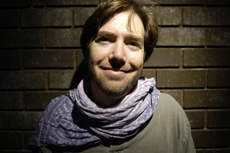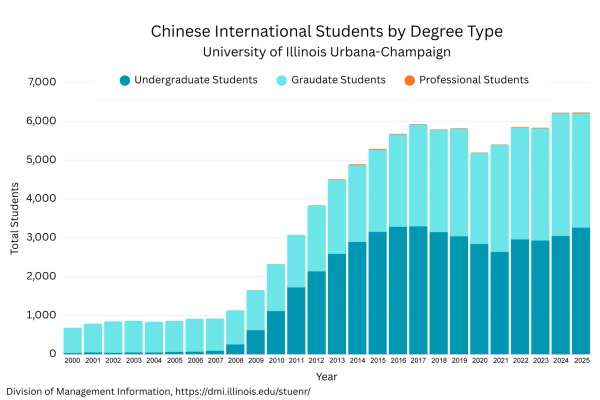Hartnett finds freedom as professor

Dan McDonald
Oct 22, 2004
Last updated on May 11, 2016 at 04:32 p.m.
Stephen John Hartnett, assistant professor of speech communications at the University, said he had no clue what career path he wanted to follow while he was growing up.
“I just wanted to see the world, experience things and travel,” Hartnett said, leaning back in his wooden chair. “I kind of fell into a career very late.”
Hartnett’s office reflects his career with snippets of his life throughout the room.
WEFT 90.1 FM Community Radio plays in the background. Paintings and posters cover the wall above his desk. Seven full bookshelves line the walls. Three file cabinets sit in the left corner with pictures posted on the side of one cabinet.
Get The Daily Illini in your inbox!
One of the paintings above his desk is from “Lefty,” a student at San Quentin Prison who Hartnett taught when he volunteered there. Hartnett was awarded the San Quentin State Prison Outstanding Volunteer Service Award for teaching college courses to prisoners, including topics such as slavery, the death penalty and even philosophy. Lefty’s painting is of a prisoner with a barcode on his uniform. A flag covers the prisoner’s face, and a rope wraps around the flag.
Hartnett said the painting was an attempt “to redeem (and) to think critically about what feels like a horrible situation by searching for the underlying beauty, the beauty that could be a possible alternative.”
While attending Rutgers College, his interests focused on music. Hartnett said he liked to play rock ‘n’ roll, but earned money doing barbershop quartets, jazz and dinner theatre. With his guitar and singing skills, Hartnett co-produced three critically acclaimed recordings with the Icemakers of the Revolution, a Midwestern rock ‘n’ roll band at the time.
During his junior year in college, Hartnett studied abroad in South Hampton, England. He spent the summer biking around England, Ireland and Scotland. For the next several summers, he had a variety of jobs to fund his European trips.
“I would get some horrible job that would make me as much money as possible. And I would stick with it until I had a couple thousand dollars in the bank and then I would split,” he said.
His job list included driving a forklift at a factory and working with a road crew laying pavement. But Hartnett said his best job was driving a delivery truck along the east coast for a printing company.
After Hartnett graduated, he realized pursuing a musical career would be too difficult for economic reasons. Hartnett, a free thinker, also said he did not want to compromise his freedom and individuality by entering the corporate world.
“It was also clear that if I got some sort of corporate job that I’d just shoot myself,” Hartnett said. “So the idea of becoming a thinker, a reader, a writer and a teacher seemed like a way to have my cake and eat it too.”
Hartnett earned masters and doctoral degrees in the Department of Literature at the University of California at San Diego in 1990 and 1992, respectively. He came to teach at the University in 1999 after teaching at the University of California at Berkeley and Ball State University in Indiana.
Hartnett said being a professor is “so cool” because he still enjoys his freedom within an institutional framework.
Matti Bunzl, director of the Illinois Program for Research in the Humanities and associate professor in the University’s anthropology department, said he admires Hartnett for different reasons.
“He’s a remarkable scholar, truly a dedicated scholar and intellectual and a great friend. I greatly admire him,” Bunzl said.
Bunzl also said he goes to Hartnett when something is happening in the world.
“I’ve learned a lot about America from him. I think (his work is) incredibly important,” Bunzl said.
Hartnett wrote a poem in response to the events of Sept. 11, entitled “9/11 and The Poetics of Complicity: A Love Poem for A Hurt Nation.” It was published in 9/11 in American Culture, by Norman Denzin and Yvonna Lincoln.
“I think that for a lot of us after 9/11, we were shocked,” Hartnett said. “We were stunned. We didn’t know what to think. We were scared, and we felt torn between a sense of patriotism, but also for me, a great concern that my government was about to do horrible things.”
Zohreh Sullivan, University professor of comparative and world literature, was a mentor for Hartnett when he first arrived at the University.
She was most impressed by the work he has done in his activism for prison education reform and his interest in national movements for peace.
“He is a remarkable person, generous with his attention and time, a rare and wonderful human being … he makes things happen,” she said.





